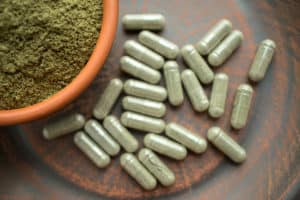
WHAT IS DRUG ADDICTION?
The National Institute on Drug Addiction describes drug addiction as “a chronic complex illness that is characterized by intense and, at times, uncontrollable drug craving, compulsive drug seeking and use that persist even in the face of devastating consequences”.
COMMON TREATMENTS FOR DRUG ADDICTION
The usual treatment to break the cycle of drug addiction and to manage withdrawal symptoms is medication-assisted programs which substitute the addictive opioid with medications such as methadone or buprenorphine. A newer drug called Lucemyra (lofexidine) was recently FDA-approved for the treatment of opioid use disorder.
Despite the availability of FDA-approved drugs for managing addiction, there is a growing number of patients seeking unregulated treatment options to self-manage their opioid dependence and withdrawal symptoms. Some of these therapies may have addictive potential of their own.
KRATOM – A LEGAL SUBSTITUTE FOR OPIOID ADDICTION?

One such option is a legal dietary herbal supplement called kratom. Leaves of this plant have been used for centuries to relieve fatigue, pain, and to treat opium addiction. It is readily available in head shops, gas stations, and via the internet in the form of leaves, tablets, capsules, extracts, and concentrates. It can be chewed, smoked, ingested, or brewed into tea. Other names for kratom include Biak, Ketum, Kakuam, Ithang, and Thom.
Some claim that kratom is useful in kicking a heroin or opioid addiction. This claim has been challenged by addiction experts who express concern over potential side effects such as difficulty breathing, fast heartbeat, high blood pressure, agitation, nausea, vomiting, confusion, tremors, and sweating. In addition, kratom is considered to be a mind altering substance that can produce a “high” within 5-10 minutes of ingestion, lasting up to 2-5 hours. Over time, kratom use may lead to tolerance and physical dependence much like opioid drugs do.
Attempts by the Drug Enforcement Administration (DEA) to make kratom illegal are ongoing, but to date protests by supporters have kept it legal to sell, possess, and use in most U.S. states, including Missouri.
WHAT SHOULD YOU DO IF YOU SUSPECT KRATOM ABUSE OR ADDICTION?
Call the Missouri Poison Center at 1-800-222-1222 for advice if you know someone who is using kratom at greater than recommended doses, no matter what the reason. We can help direct you to the safest next steps. If the person is unconscious, call 911 for immediate assistance. For more information about substance abuse disorders, go to http://findtreatment.samhsa.gov. This website is managed by the Substance Abuse and Mental Health Services Administration. They also have a national hotline for treatment referral information: 1-800-662-4357.
For questions or concerns about kratom abuse, call the Poison Help line at 1-800-222-1222. Specially trained nurses and pharmacists are available 24/7/365 to answer your questions. The service is free and confidential.
